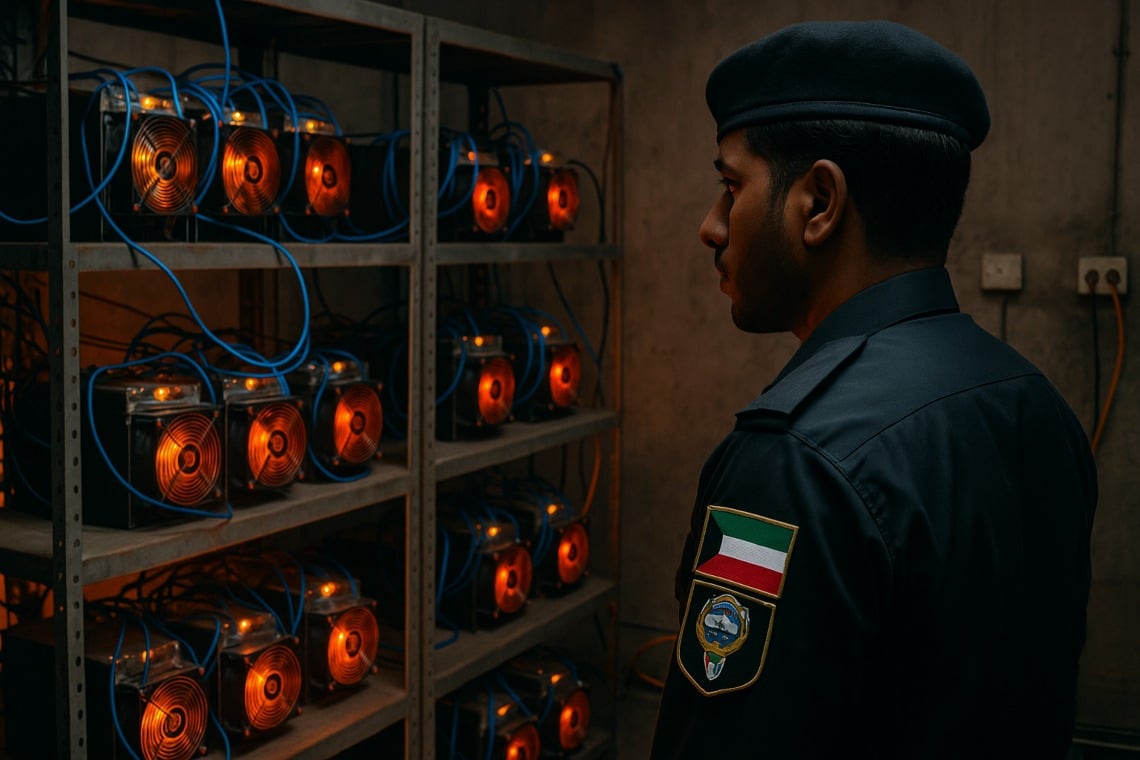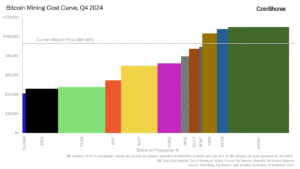
1,000 illegal cryptocurrency mining sites discovered
The governo del Kuwait has issued a brand new and strict warning in opposition to mining illegale di criptovalute, after an investigation into electrical energy consumption recognized over 1,000 siti sospetti scattered all through the nation.
The formal warning comes from the Ministry of the Inside, which reiterated that mining is a prohibited and completely unregulated exercise ranging from July 2023, when the Monetary Markets Authority had imposed a whole cease on all actions associated to cryptocurrencies, together with exchanges and transfers.
Power too low cost to withstand the temptation: over 1,000 unlawful mining farms blocked in Kuwait
Regardless of the legislative framework being clear, it’s evident that the low price of electrical energy in Kuwait – among the many most advantageous on this planet – represents a robust attraction for clandestine miners. The authorities emphasize how this exercise entails critical penalties for all the inhabitants.
In keeping with an official notice from the Ministry of the Inside, cryptocurrency mining “causes overloads to {the electrical} grid in residential, industrial, and repair areas, resulting in blackouts and endangering public security in addition to disrupting important providers.” Along with reiterating the ban, the Ministry has ordered the offenders to “instantly right their place,” warning that in any other case they are going to be prosecuted “underneath the present legal guidelines.”
Joint operation and pink zones underneath commentary
The investigative blitz represents a cooperation between totally different ministries, significantly with the Ministry of Electrical energy, Water, and Renewable Energies, which offered important information to establish unlawful actions. Particularly, within the area of Al-Wafra, anomalies have been found in 100 properties, the place the vitality demand remained constantly excessive all through the day, with out the conventional variations typical of personal homes.
The spokesperson for the Ministry, Fatima Jawhar Hayat, revealed that, in a few of these circumstances, vitality consumption exceeded 100,000 kilowatt-hours simply in March 2025, a determine equal to twenty instances the common consumption of close by properties. Such a anomalous vitality exercise is a transparent identifier of mining.
Kuwait: imminent sanctions for unlawful mining farms and steady monitoring
Though the destiny of the inhabitants of the improperly concerned dwellings is just not clear, the authorities have assured that the controls will proceed all through the nationwide territory, sustaining explicit consideration to unjustified electrical energy consumption. The synergy between the Ministry of the Inside and that of Power highlights a brand new part within the battle in opposition to digital crime and the improper use of public sources.
In 2022, in accordance with the Cambridge Bitcoin Electricity Consumption Index, Kuwait accounted for under 0.05% of the worldwide hashrate of Bitcoin, a determine which may appear marginal, however that marks some extent of consideration for the Kuwaiti authorities. The low impression, nonetheless, didn’t stop the federal government from adopting a strictly repressive line ranging from the next yr.
Cryptocurrencies: authorized ban, however social use on the rise
Regardless of the specific ban established on the nationwide stage, there are tangible indicators that the inhabitants continues to present curiosity and spend money on digital property. An emblematic case dates again to final January, when a fraudulent token known as Bitcoin Kuwait triggered important losses to small buyers, collapsing in worth simply after the launch and leading to a collective lack of about 40 million {dollars}.
The one to publicly denounce the scandal was the researcher Dr. Safaa Zaman, who in a put up on the platform X accused the authorities of poor oversight actions, strongly calling for extra strong and well timed laws on the matter. Her phrases, “The place are the controls? The place are the legal guidelines? And the fraudster?”, replicate the widespread feeling of frustration among the many public and the rising demand for cover and transparency within the sector.
Problem between innovation and legality
The Kuwaiti context suits into an more and more complicated international panorama, the place on one hand blockchain technologies and cryptocurrencies appeal to financial curiosity and monetary innovation, whereas however they elevate dangers for vitality, monetary, and social safety. In Kuwait, these dangers are amplified by a closely sponsored vitality system, which makes mining interesting even within the face of authorized prohibitions.
The present state of affairs appears to point that, past the proclamations, it is going to be essential for the Kuwaiti authorities to strengthen management methods, develop new particular legal guidelines, and actively contain each the scientific neighborhood and the authorized neighborhood to forestall an escalation of unlawful actions and collateral injury.
Conclusions
Kuwait is dealing with a double problem: strengthening the enforcement of the already current ban and addressing a rising underground crypto exercise, which dangers damaging infrastructure, buyers, and institutional credibility. The detection of over 1,000 unlawful mining websites is a wake-up name too loud to be ignored and foreshadows a attainable tightening of sanctions within the coming months.
If within the brief time period the aim appears to be to eradicate clandestine actions, in the long run a broader and extra fashionable regulatory method will likely be wanted, able to addressing one of the crucial disruptive improvements of the final decade: the digital economic system based mostly on blockchain. Solely with transparency, monitoring, and efficient rules will or not it’s attainable to mix safety and innovation in a nation that, on account of its place and sources, performs a strategic position within the area.









